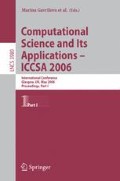Abstract
This study proposes a new complex system modeling approach by extending a bias-variance trade-off into a bias-variance-complexity trade-off framework. In the framework, the computational complexity is introduced for system modeling. For testing purposes, complex financial system data are used for modeling. Empirical results obtained reveal that this novel approach performs well in complex system modeling and can improve the performance of complex systems by way of model ensemble within the framework.
Access this chapter
Tax calculation will be finalised at checkout
Purchases are for personal use only
Preview
Unable to display preview. Download preview PDF.
References
Geman, S., Bienenstock, E., Doursat, R.: Neural networks and the bias/variance dilemma. Neural Computation 4, 1–58 (1992)
Myung, I.J., Pitt, M.A.: Applying Okham’s razor in modeling cognition: A Bayesian approach. Psychonomic Bulletin & Review 4, 79–95 (1996)
Moody, J.: Prediction risk and architecture selection for neural networks. In: Cherkassky, V., Friedman, J.H., Wechsler, H. (eds.) From Statistics to Neural Networks: Theory and Pattern Recognition Applications. NATO ASI Series F. Springer, Heidelberg (1994)
Hardle, W., Hall, P., Marron, J.S.: How far are automatically chosen regression smoothing parameters from their optimum? Journal of the American Statistical Association 83, 86–95 (1988)
Akaike, H.: Statistical predictor information. Annals of the Institute of Statistical Mathematics 22, 203–217 (1970)
Shwartz, G.: Estimating the dimension of a model. Annals of Statistics 6, 461–464 (1978)
Hansen, L.K., Salamon, P.: Neural network ensembles. IEEE Transactions on Pattern Analysis and Machine Intelligence 12, 993–1001 (1990)
Opitz, D., Maclin, R.: Popular ensemble methods: An empirical study. Journal of Artificial Intelligence Research 11, 169–198 (1999)
Breiman, L.: Bagging predictors. Machine Learning 24, 123–140 (1996)
Freund, Y., Schapire, R.E.: Experiments with a new boosting algorithm. In: Machine Learning: Proceedings of the 13th International Conference, pp. 148–156 (1996)
Krogh, A., Sollich, P.: Statistical mechanics of ensemble learning. Physical Review E 55, 811–825 (1997)
Perrone, M.P., Cooper, L.N.: When neural networks disagree: Ensemble methods for hybrid neural networks. In: Mammone, R.J. (ed.) Neural Networks for Speech and Image Processing, pp. 126–142. Chapman-Hall, Boca Raton (1993)
Krogh, A., Vedelsby, J.: Neural network ensembles, cross validation, and active learning. In: Tesauro, G., Touretzky, D., Leen, D. (eds.) Advances in Neural Information Processing Systems, pp. 231–238. MIT Press, Cambridge (1995)
Author information
Authors and Affiliations
Editor information
Editors and Affiliations
Rights and permissions
Copyright information
© 2006 Springer-Verlag Berlin Heidelberg
About this paper
Cite this paper
Yu, L., Lai, K.K., Wang, S., Huang, W. (2006). A Bias-Variance-Complexity Trade-Off Framework for Complex System Modeling. In: Gavrilova, M., et al. Computational Science and Its Applications - ICCSA 2006. ICCSA 2006. Lecture Notes in Computer Science, vol 3980. Springer, Berlin, Heidelberg. https://doi.org/10.1007/11751540_55
Download citation
DOI: https://doi.org/10.1007/11751540_55
Publisher Name: Springer, Berlin, Heidelberg
Print ISBN: 978-3-540-34070-6
Online ISBN: 978-3-540-34071-3
eBook Packages: Computer ScienceComputer Science (R0)

